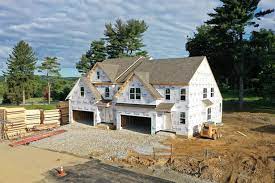First off, Builders have it rough in this marketplace with supply chain issues, labor turnover, communication barriers and inexperience so I won’t be too hard on them, I will however provide you with some insight on how a buyer can handle these adverse conditions.
Getting a new home construction inspection is essential for ensuring the quality and integrity of your new property. Before we begin here are “3 myths” that should be avoided:
- “Its inspected by the County, they know what they are doing”- County building inspectors are not nearly as qualified or experienced as licensed home inspector if they were they wouldn’t be working for the dismal salary provided by the local government.
- “I trust the Superintendent”- Supervisory experience varies greatly from house to house, from site to site and from super to super. The bigger developers train all there Superintendents before they are allowed to enter the field, and they receive a fractional salary throughout their training period. Following training, every super is then offered a bonus structure for every home completed (typically $500). If you were the super working 60,70,80 hrs/ week managing the construction of 20,30,40 homes at any given time for a fractional salary not only would you miss a lot of defects due to inexperience, they’ll tell you everything is good because that bonus is looking real good.
- “My Brother/ Dad is a Builder”- Most Builders, Contractors, Tradespeople have their New home inspected because they know the difference between building it and inspecting it.
~~~ ALWAYS REMEMBER “COSMETIC DEFECTS” WILL ONLY BE ADDRESSED BY THE BUILDER PRIOR TO CLOSING, POST CLOSING COSMETIC DEFECTS ARE ON THE BUYER ~~~
Here are 25 reasons why it’s important to invest in a new home construction inspection:
- Identify construction defects: An inspection can reveal any potential defects or issues in the construction of the home that may need to be addressed by the builder.
- Structural integrity: Inspections can assess the structural components of the home, such as the foundation, walls, and roof, to ensure they are sound and built to code.
- Safety concerns: Inspections can identify any safety hazards, such as faulty electrical wiring, inadequate insulation, or improper ventilation, that could pose risks to occupants.
- Code compliance: Inspections can verify that the construction meets local building codes and regulations, ensuring that the home is built to the required standards.
- Prevent future problems: Identifying and addressing construction issues early on can help prevent more significant problems from arising in the future, saving you time and money.
- Builder accountability: A new construction inspection can hold the builder accountable for any deficiencies found during the inspection process, ensuring they are addressed before closing.
- Warranty protection: Many builders offer warranties on new homes, and an inspection can help identify any issues that should be addressed under the warranty before it expires.
- Peace of mind: An inspection provides peace of mind for homebuyers, knowing that their investment is structurally sound and meets the necessary quality standards.
- Energy efficiency: Inspections can evaluate the home’s energy efficiency features, such as insulation, windows, and HVAC systems, to ensure they meet energy-saving standards.
- Plumbing and electrical systems: An inspection can verify that the plumbing and electrical systems are installed correctly and functioning properly, avoiding future issues.
- Quality control: Inspections ensure that the home is constructed to the expected quality level and that the materials used are of the appropriate standard.
- Identify hidden issues: Inspectors can uncover hidden issues that may not be visible to the untrained eye, such as mold, leaks, or pest infestations.
- Code upgrades: Inspections may reveal areas where the builder needs to make upgrades or improvements to meet current building codes, ensuring your home is up to date.
- Negotiation leverage: If any significant issues are identified during the inspection, you can use them as leverage for negotiations with the builder to address the problems or adjust the price accordingly.
- Insurance considerations: Insurance companies may require an inspection report to determine the insurability and coverage terms for the property.
- Proper ventilation: Inspections can assess the ventilation systems, including bathroom fans and kitchen exhausts, to ensure they are installed correctly and functioning adequately.
- Drainage and grading: Inspections can evaluate the drainage around the property, including grading and gutters, to ensure water flows away from the foundation, preventing moisture-related issues.
- Exterior issues: An inspection can identify any issues with the exterior of the home, such as siding, windows, doors, or the roof, ensuring they are properly installed and sealed.
- Compliance with plans: Inspections can verify that the construction aligns with the original plans and specifications, ensuring the home is built as intended.
- Financial protection: Identifying construction defects before closing on the property can potentially save you from significant financial burdens down the line.
- Professional expertise: Home inspectors have the training and experience to detect issues that an average homebuyer might overlook, ensuring a thorough assessment.
- Avoid surprises: An inspection can help you avoid unexpected repairs or expenses after moving into your new home.
- Knowledge transfer: During the inspection, the inspector can provide you with valuable information about the home’s systems, maintenance requirements, and how to operate them effectively.
- Documentation: An inspection report provides a detailed record of the home’s condition at the time of the inspection, which can be useful for future reference or resale purposes.
- Investment protection: A new home construction inspection is an investment in protecting your most significant asset, ensuring its long-term value and livability.
Remember, it’s essential to hire a reputable and certified home inspector to conduct the inspection and provide you with a comprehensive report and hold the builder accountable.



